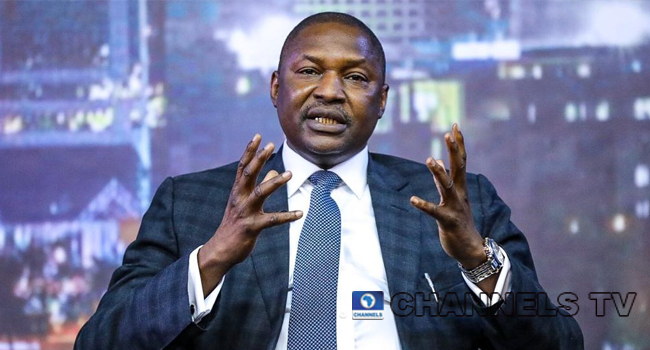
![]()
National Assembly Has No Power To Summon Buhari
The Nigerian Parliament has no got no constitutional rights to summon President Muhammadu Buhari, Attorney-General of the Federation (AGF), Abubakar Malami has claimed.
According to him, there is no constitutional provision that gives the Nigerian National National Assembly the power to call the president or challenge him in any way.
Malami disclosed this on Wednesday in a released statement titled ‘Buhari’s Summon: NASS Operates Outside Constitutional bounds.’
According to the statement: “National Assembly has no constitutional power to envisage or contemplate a situation where the president would be summoned by the national assembly on the operational use of the armed forces.”
He also noted the right of the President to engage the National Assembly and appear before it is “inherently discretionary in the President and not at the behest of the National Assembly.”
It will be recalled that members of the House of Representatives on December 1, this year resolved to invite President Buhari to brief the house on the true state of the security situation in the country.
The decision to summon President Buhari was taken at plenary when the House considered a motion moved by members from Borno State on the recent massacre of 43 rice farmers in the state by Boko Haram insurgents.
As the Commander in Chief, the President has exclusivity on security and has confidentiality over security. These powers and rights he does not share. So, by summoning the President on National Security operational Matters, the House of Representatives operated outside constitutional bounds. President’s exclusivity of constitutional confidentiality investiture within the context of the constitution remains sacrosanct.
Responding to parliamentary request, the President’s Personal Assistant on Social Media, Lauretta Onochie announced on Monday, December 7 that the President will address a joint session of the National Assembly.
See the AGF’s full statement below…
BUHARI’S SUMMON: NASS OPERATES OUTSIDE CONSTITUTIONAL BOUNDS
President Muhammadu Buhari of the Federal Republic of Nigeria has recorded tremendous success in containing the hitherto incessant bombing, colossal killings, wanton destruction of lives and property that bedeviled the country before attaining the helm of affairs of the country in 2015.
The confidentiality of strategies employed by the President as the Commander in Chief of the Armed Forces of the Federal Republic of Nigeria is not open for public exposure in view of security implications in the probable undermining of the war against terror.
The fact that President Muhammadu Buhari was instrumental to the reclaiming of over 14 Local Governments previously controlled by Boko Haram in the North East is an open secret, the strategies for such achievement are not open for public expose.
While condoling the bereaved and sympathizing with the victims of the associated insecurity in the country, Attorney-General of the Federation and Minister of Justice, Abubakar Malami, SAN maintained that national security is not about publicity and the nation’s security architecture cannot be exposed for the sake of getting publicity.
He said Mr. President has enjoyed Constitutional privileges attached to the Office of the President including exclusivity and confidentiality investiture in security operational matters, which remains sacrosanct.
Malami added that the National Assembly has no Constitutional Power to envisage or contemplate a situation where the President would be summoned by the National Assembly on the operational use of the Armed Forces.
The right of the President to engage the National Assembly and appear before it is inherently discretionary in the President and not at the behest of the National Assembly.
The management and control of the security sector is exclusively vested in the President by Section 218 (1) of the Constitution as the Commander in Chief of the Armed Forces including the power to determine the operational use of the Armed Forces. An invitation that seeks to put the operational use of the Armed Forces to a public interrogation is indeed taking the constitutional rights of law-making beyond bounds.
As the Commander in Chief, the President has exclusivity on security and has confidentiality over security. These powers and rights he does not share. So, by summoning the President on National Security operational Matters, the House of Representatives operated outside constitutional bounds. President’s exclusivity of constitutional confidentiality investiture within the context of the constitution remains sacrosanct.
Abubakar Malami, SAN
Attorney General of the Federation and Minister of Justice)
9th December 2020.


